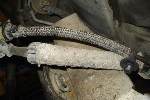Chris_94
Member
- Joined
- May 27, 2012
- Messages
- 27
- Reaction score
- 0
- City, State
- Arvada, CO
- Year, Model & Trim Level
- 1994 4x4 XLT V6
I tried a couple searches and can't really find an answer other than "take it to a shop". Hoping somebody can tell me how to fix this myself. I'm handy, but not an expert. Been around cars my whole life. I'm just not real good with all the new electronic stuff, so I tend to buy and fix or maintain older cars. She drives the Explorer and I've been driving a 1994 Nissan Harbody 4x4 pickup since 1998.
I replaced the front calipers on my 1994 Explorer XLT. It has ABS. Bled the brakes the way you're supposed to do it. PR, DR, PF, DF - in that order. Bled all lines until new, clear fluid was running out. Took a quart, but we probably over did it. My brother worked the bleeder valves. I pumped the pedal and kept the reservoir full.
Get in it to drive and the pedal goes almost to the floor before the truck will stop. Won't really even pump up hard. During the test drive, we went a variety of speeds. If I slam on the brake pedal, I can hear and feel the ABS pump working. The system seams to be functioning correctly. But the pedal is soft. It stops amazingly fast, even from 65MPH. It stops fast from 25MPH and 40MPH. It's just the darn pedal is going all the way to the floor.
I started doing searches here and on google. There was a a guy that mentioend a tool, but I think he came to the conclusion the tools weren't available anymore. There was another guy that took the ABS system off his truck. I'm not opposed to taking the ABS off the truck, but I'd need some help from you guys.
We have another vehicle to use, so it's not an emergency. I just gotta get it fixed. Can't go campin', fishin' or huntin' until it's functional again.
I replaced the front calipers on my 1994 Explorer XLT. It has ABS. Bled the brakes the way you're supposed to do it. PR, DR, PF, DF - in that order. Bled all lines until new, clear fluid was running out. Took a quart, but we probably over did it. My brother worked the bleeder valves. I pumped the pedal and kept the reservoir full.
Get in it to drive and the pedal goes almost to the floor before the truck will stop. Won't really even pump up hard. During the test drive, we went a variety of speeds. If I slam on the brake pedal, I can hear and feel the ABS pump working. The system seams to be functioning correctly. But the pedal is soft. It stops amazingly fast, even from 65MPH. It stops fast from 25MPH and 40MPH. It's just the darn pedal is going all the way to the floor.
I started doing searches here and on google. There was a a guy that mentioend a tool, but I think he came to the conclusion the tools weren't available anymore. There was another guy that took the ABS system off his truck. I'm not opposed to taking the ABS off the truck, but I'd need some help from you guys.
We have another vehicle to use, so it's not an emergency. I just gotta get it fixed. Can't go campin', fishin' or huntin' until it's functional again.










